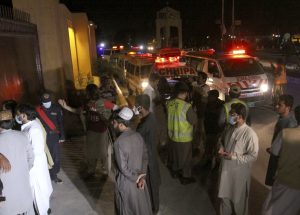On April 21, a bomb attack in Quetta, the capital of Pakistan’s Balochistan province, killed at least four people and injured 12 others.
The suicide bombing, which has now been claimed by the Tehreek-e-Taliban Pakistan (TTP), took place in the parking lot of the Serena Hotel. It is the only four-star hotel in Quetta and is considered one of safest places in the city.
“Our suicide bomber used his explosive filled car in the hotel,” a TTP spokesman said in claiming the attack.
The TTP’s latest attack in Quetta means that the group has returned to Pakistan’s cities. Previously, the group had been carrying out attacks in the country’s tribal areas adjacent to Afghanistan. “The attack underscores TTP’s enhanced operational capabilities. TTP or any militant group in Pak has pulled off a vehicle borne suicide attack after a long hiatus. The fact that TTP is able recruit & train suicide bombers and successfully deploy them is alarming,” said Abdul Basit, an expert on counterterrorism and security in Pakistan, on Twitter.
“Hitherto, TTP’s reunification was more of a sign of desperation to survive. But, now it’s safe to assume that [the group is] beyond revival as the group has resurrected its operational capabilities and seems to be enhancing its organizational footprint in Pakistan,” he added.
Some unconfirmed reports indicate that the Chinese ambassador, who was reportedly staying at the hotel when the attack took place, was the target. If true, the situation should raise alarm bells in Pakistan’s policymaking circles as the TTP has not been known for targeting the Chinese interests in Balochistan. Generally Baloch separatists have mounted such attacks.
For instance, in 2019, Baloch separatists attacked the five-star Pearl Continental hotel in Gwadar, where reportedly many Chinese personnel were staying. In 2020, another attack by Baloch separatists targeted the Pakistan Stock Exchange (PSX) building in Karachi. Unnamed security sources speaking to India Today described the group behind that attack, the banned Balochistan Liberation Army (BLA), as “basically a suicide squad which has been tasked with targeting security forces, installations and Chinese interests in Pakistan.”
In response to the Serena Hotel attack, the Chinese Embassy in Pakistan released a statement confirming that the ambassador was in Quetta at the time, but was not in the hotel when the attack occurred. No Chinese casualties have been reported.
“China strongly condemns the terrorist attack, expresses condolences to the unfortunate victims, and sympathy to the injured,” the statement said.
So far, the TTP has released three different statements on the attack. The first statement mentioned targeting locals and foreigners staying at the hotel. The second statement withdrew the mention of foreigners, instead stating that police officials were the target. In another statement, the group accused Pakistan’s media of misreporting the attack.
Analysts say that “The pattern of responsibility claim is unusual,” raising questions whether the “TTP is behind this attack.”
At this point, it is unclear whether the TTP carried out the attack in Quetta independently or jointly with some other local groups. Are Baloch separatists assisting the group, as they both share the goal of harming the state at any cost? The TTP, which has been wanting to make a comeback, may not mind taking help from Baloch separatists, while the latter could avoid retaliation by having the TTP claim the attack.
In any case, the TTP’s attack in Balochistan is meant to send a message to Pakistan’s security agencies that the group is not only back but can and will target areas that previously may not have been a part of its operational domain. Arguably, the attack is aimed at showing the Pakistani state that the group will do anything and everything to weaken it.
Last month, the TTP threatened Pakistani women rights activists for celebrating International Women’s Day. “We want to send a message to those organizations who are actively spreading obscenity and vulgarity in our beloved Pakistan,” a TTP statement said, addressing the marchers.
“Fix your ways, there are still many young Muslims here who know how to protect Islam and and the boundaries set by Allah.”
Last week, the group threw its weight behind the Tehreek-e-Labbaik Pakistan (TLP) and its deadly protests in Pakistan. “We stand by those who sacrificed their lives for the honor of the Holy Prophet (Peace Be Upon Him) in this hour of grief, and pay tribute to their honor and remind the military forces of their worth. We reassure them that we will take account of every drop of bloodshed of these martyrs,” the TTP said in an open letter.
“We want to remind them that these governments and military institutions have always been unreliable, unprofessional and lying. Therefore, they should not be trusted and rather (waging) armed struggle against them is the only solution,” the letter added.
The latest surge in TTP activity came after peace talks between the terrorist group and the Pakistani government fell apart in late 2020 or early 2021, sources exclusively revealed to The Diplomat.
It’s alarming that a group supposedly on the run after years of counterterrorism operations has managed to attack an area that was hardly its domain even when the group was active in major cities between 2008 and 2014. The relatively successful reemergence of TTP indicates that Pakistan counterterrorism policy has not been a success as the group is quickly developing into a major threat again.
































